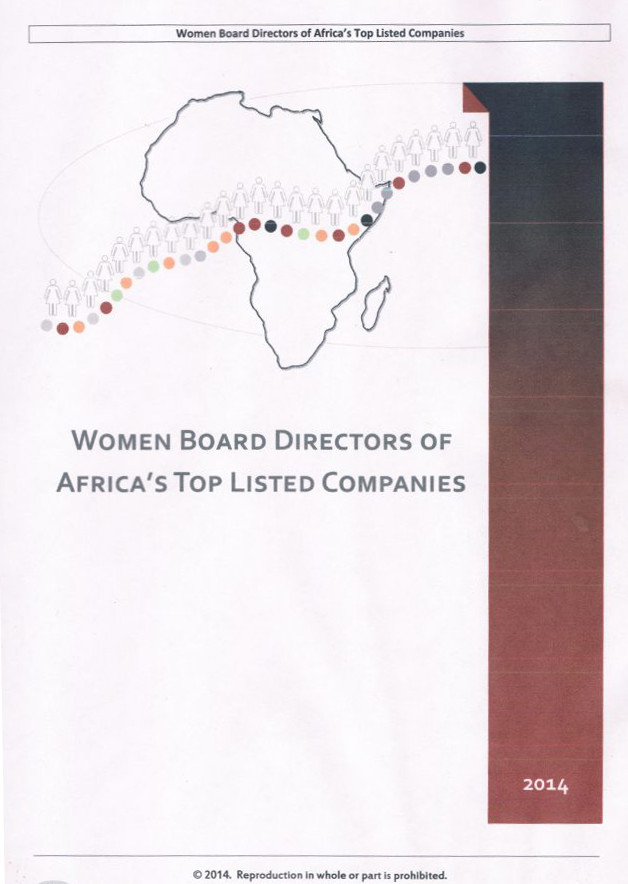2015 CWDI Report:
Where are the Women: Inclusive Boardrooms in Africa’s Top Listed Companies
The 2014 CWDI Report on Women Board Directors in Africa focuses on 307 companies based in 12 African economies. The study found that women held 12.7% of board seats in those economies.
Key Findings
CWDI Research Commissioned by the African Development Bank
The Numbers
- Women hold 12.7% of board directorships (364 out of 2,865) in 307 listed companies based in 12 African countries. This is 4.6% lower than the 17.3% women’s representation on the boards of the 200 largest companies globally.
- The majority of African companies have at least 1 woman board director. However,about one-third (32.9%) have 0 women on board, and another one-third only have one female director (33.6%), so the majority of African companies have minimal women’s presence on boards.
- The percentage of women board directors in large-cap listed companies (which account for 30% of companies) is 14.4%, higher than mid- or small-caps, keeping in line with global patterns.
- Though trailing the percentage of women board directors in blue-chip companies in the EU (18%) and the US Fortune 500 (16.9%), Africa’s large-cap percentage of 14.4% women-held board seats is significantly higher than the average percentage of listed companies in the Asia-Pacific region (9.8%), Latin America (5.6%), and the Middle East (1%).
- Of the 12 countries included in the report, Kenya has the highest percentage of women board directors with 19.8%. South Africa, Botswana, Zambia, follow with above average percentages of 17.4%, 16.9%, 15.9%, and 15.7%, respectively.
- Cote d’Ivoire has the lowest percentage (5.1%), while the three North African countries of Egypt (8.2%), Tunisia (7.9%), and Morocco (5.9%) have slightly higher percentages. Tanzania (14.3%), Uganda (12.9%), and Nigeria (11.5%) hover around the continental average of 12.7%.
- Among large cap companies, the company topping the Top Ten list of highest percentages of women directors is East African Breweries, based in Kenya, which had five women directors on its 11-member board, a percentage of 45.5%, at the end of 2013. Three South African companies hold the next highest percentages: Impala Platinum Holdings (38.5%), Kumba Iron Ore (36.4%), and Woolworths Holdings (30.8%).
- Top among the mid-cap companies are Stanbic Bank of Uganda and Barclays Bank of Botswana, both with 33.3% women directors. Kenya Power and Lighting and Lafarge Zambia lead the small caps with 33.3% women board directors, while Camelot Ghana leads the micro-caps with three women directors out of six (50%).
Barriers
Business Culture
- The majority of board appointments continue to be made in a largely informal process, based in the proverbial “old-boy” networks, fed by family, clan, school and business relations.
- Boards often lack understanding of the necessity and benefits of a diverse board.
- Lack of visibility of women in senior executive posts is an obstacle to more women gaining more board seats.
Structural Barriers – Corporate
- In many African countries, corporate governance is still in its infancy without a transparent nomination process.
- Smaller boards (9.3 members versus global average of 12.8) plus few limitations on length of board service leads to fewer opportunities for board changes.
Structural Barriers – Governmental
- Weak regulatory enforcement of current guidelines make corporate reporting inconsistent and incomplete, as well as render applying additional regulations difficult.
PROPOSED RECOMMENDATIONS
- Baseline Research – Unless data is provided on the status of women on boards, it is impossible to determine what measures must be taken or what policies are needed to improve the numbers of women appointed to board seats.
- Stock Exchange listing requirements should mandate public reporting of board composition annually and provision of updates after any change of composition. Reporting should extend beyond directors’ names to include year of commencement of board appointment, age, and brief background bios. The same information should be reported on listed companies’ senior officers as well.
- African Stock Exchanges should consider including board diversity as a listing requirement for member companies.
Government’s Role
- Commissions can be established to provide a report on and recommendations for action on improving women’s access to board seats.
- Capital Markets Authorities (CMA), Securities and Exchange Commissions (SEC) and equivalent regulatory agencies must strengthen oversight of existing regulations, corporate governance guidelines, and required annual filings of companies’ information. Penalties and sanctions should be established and administered for non-compliance.
- CMAs and SECs can also consider requiring companies to provide sex-disaggregated data on women directors and in senior management in annual reports.
- Mandates for women directors should be considered as a strategy for addressing the lack of women in Africa’s largest companies. Countries planning to use legal mandates should begin with state-owned companies where the government already has a major stake or is the principal owner.
Private Sector’s Role
- Corporate governance codes should outline good corporate practice for board nominations to ensure transparent nomination process.
- Corporate governance codes should outline age or tenure requirements, requiring regular elections and age limitation of 70.
- Corporate governance code commissions should consider requiring companies to report women’s representation at all levels in the company – on the board of directors, in senior management, and company-wide.
- Corporate governance codes should include stronger gender diversity language to urge and if possible, to require companies to ensure female representation on boards.
Civil Society’s Role
- Women’s groups, Institutes of Directors, and other professional associations can apply pressure to effect change in boardroom composition.
- Women themselves must be proactive in applying for board positions.

